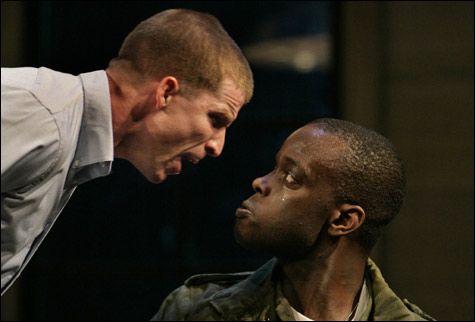
STREAMERS: The demoralizing effects of fear and aggression on the human spirit.
|
War is hell in
STREAMERS
— and few of the characters have even been to one. The four disparate young men at the heart of David Rabe’s 1976 New York Drama Critics Circle Award–winning play (presented by the Huntington Theatre Company at Boston University Theatre through December 9) haven’t hit the first circle of the Inferno — they’re in the vestibule, cooling their heels (if not their tempers) in a Virginia barracks circa 1965, apprehensively waiting to be shipped off to Vietnam. It’s like camp, except that the counselor figures are bullying and drunk and there are more horrifying things on the horizon than being short-sheeted as the variously scared and stoic twentysomethings slip in and out of uniform while trying on what it means to be a man.
Streamers, the third of an unintended Vietnam trilogy that includes The Basic Training of Pavlo Hummel and Sticks and Bones, was well regarded in its time, but it does not regularly get the dust knocked off its Army boots. This is the first time I have seen it since it debuted at Long Wharf Theatre in a Mike Nichols–directed production that moved to Broadway. It may be that the racial, class, and sexual tensions roiling around, which eventually boil over into violence ameliorated by a heartbreakingly black-comic coda, are too discomforting. Certainly the play’s newly minted soldiers, perched on an early edge of American disillusion, seem naive. And we might prefer that the play’s climax be less melodramatic, its catalyst not a berserk black man. But Streamers is as brutally honest as it is brutal. Less anti-war on principle than in its depiction of the demoralizing effects of fear and aggression on the human spirit, it deserves to be seen. And the powerful Scott Ellis–helmed staging will not let you look away.
Thrown together in the harshly lit, clapboarded room of Neil Patel’s set design is a nervous cadre of recruits with little in common but their situation: witty gay child of Manhattan privilege Richie; corn-fed Wisconsin college grad Billy; affable middle-class African-American Roger; and Martin, who so loathes the Army that he’s slashed a wrist to get himself sent home. Once Martin and his compulsively trumpeted desperation are out of the way, we get inebriated bosom-buddy sergeants Rooney and Cokes, singing the metaphorical ditty about non-opening parachutes that gives the play its title, and a human bomb named Carlyle. Big, voluble, and black, Carlyle is dragging a destabilizing burden of resentment and terror as heavy as Robert Jordan’s rucksack of dynamite in For Whom the Bell Tolls — and just as certain to explode.
Rabe has said that he wrote Streamers in bursts, over the course of six or seven years. It was the first of his Vietnam plays that he undertook following his 1967 return from a two-year tour in a medical unit in that country. At first a three-way character sketch, it then acquired its geyser of violence. But, the dramatist told David Savran, author of the interview compilation In Their Own Words, it wasn’t a play yet. “There was just the killing, basically. There was no metaphor in it. There was no streamer in it, no sergeants.”
On the face of it, Streamers is a realistic work, if one in the Martin Scorsese/Quentin Tarantino vein. But the metaphor is key. As has been noted, none of the characters has been dealt a ’chute that opens; they’re all in free fall precipitated by social ills, a senseless war, an abusive military, fear of the unknown and the Other. As for the sergeants, they are the useless macho dads of the career army, turned drunk and flaccid and clownishly warlike. Cokes’s melancholy coda, in which he caps a rambling anecdote about an exploding “gook” with a rendering of “Beautiful Streamer” in imitation Korean, confers on the play a bleak profundity on whose vast, combative horizon the barracks bloodshed seems but a dot.
Ellis’s staging is simple yet nuanced, quick-trigger anger and a troubling uneasiness mixed into the masculine camaraderie. Brad Fleischer plays Billy, the upstanding if uptight college boy pushed to extremes that disgust him, as more latent homosexual than secure straight man irked by Richie’s teasing advances. Hale Appleman captures the insecurity in the irrepressibly provocative Richie. J.D. Williams is the cool if gung-ho Roger, determined to do his duty, however pointless. And John Sharian is the primally sodden Rooney. But the production hinges on the Brian Dennehy–like Larry Clarke, whose moribund Cokes drifts toward a soggy compassion, and Ato Essandoh, whose loose-cannon Carlyle inspires both pity and terror, pushing Rabe’s melodrama in the direction of tragedy.